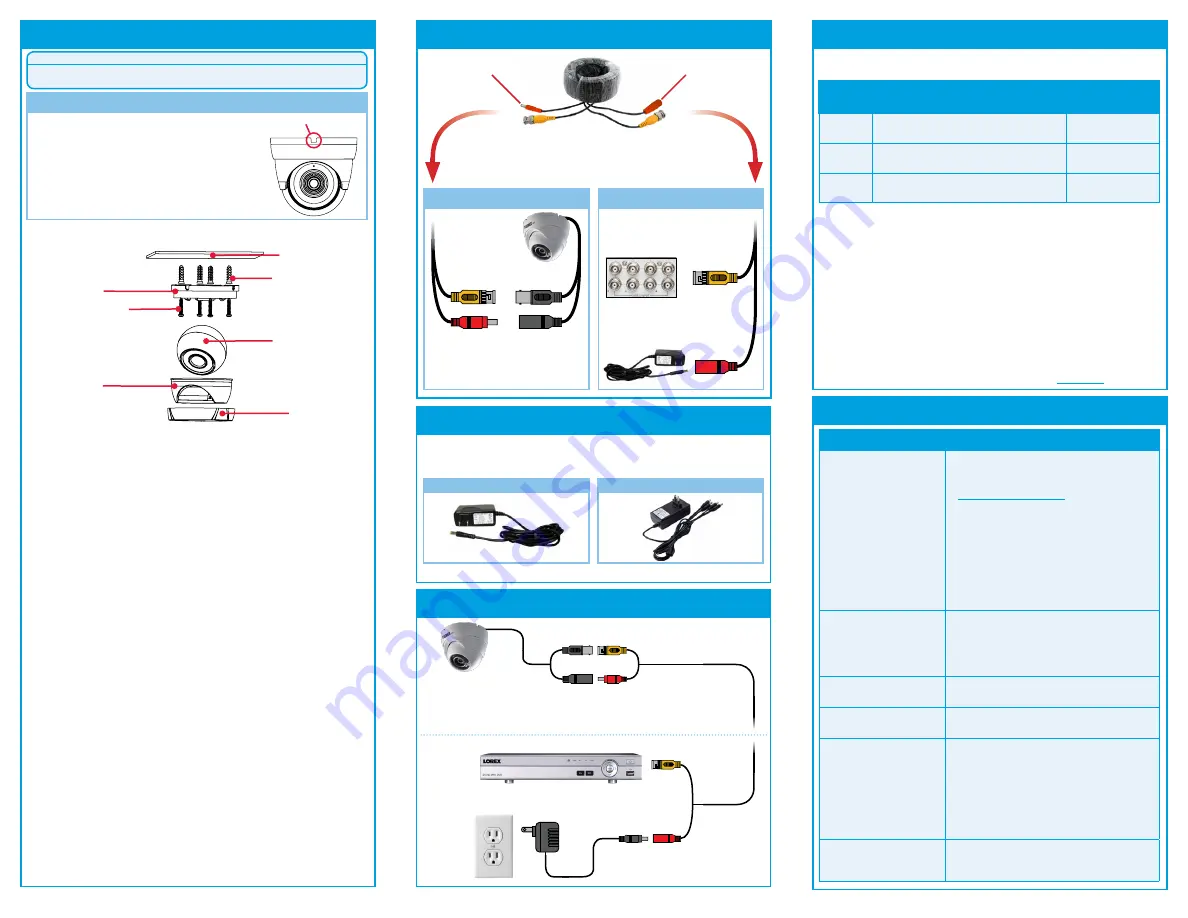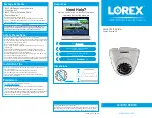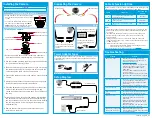
Connecting the Cameras
Individual Power Adapter*
Multi-Camera Power Adapter*
Connecting the Cameras
* Images for representation only
Mounting Surface
Camera Base
Ball Camera
Adjustment Ring
Dome Cover
Drywall Anchors (×4)
Mounting Screws (×4)
To install your camera:
Installing the Camera
Extend the cable run for your camera depending on the cable type used.
Additional extension cables sold separately. See table below:
Connect the male power head
and the BNC connector to the
camera.
Connect the BNC connector
to a video input on your DVR.
Connecting the Camera
Cable Notch
LEV4712_QSG_EN_R2
Power Adapter Types
A multi-camera power adapter that provides power to multiple cameras
or individual power adapters may be provided, depending on product
configuration.
Problem
Solution
No picture / signal
• The cameras are only compatible with
certain Lorex HD DVRs. For the full list of
compatible recorders, visit
lorex.com/compatibility
• Ensure your TV or monitor is on the correct
input channel. Common terms for input
channels: INPUT, AV CHANNEL, LINE1,
LINE2, AUX.
• Ensure your DVR is properly connected to
your TV or monitor.
• Ensure connections are properly connected.
• Ensure the camera power supply is plugged
in.
Picture is too bright
• Ensure your camera isn’t pointed directly at
a source of light (e.g., sun or spot light).
• Check the brightness settings of the DVR
and monitor.
• Move your camera to a different location.
Picture is too dark
• Check the brightness and contrast settings
of the DVR and monitor.
Night vision is not
working
• The night vision activates when light levels
drop. The area may have too much light.
Picture is not clear
• Check the camera lens for dirt, dust,
spiderwebs. Clean the lens with a soft,
clean cloth.
• Make sure that the cable run is within the
limitations specified in the section ‘Cable
Extension Options’.
• Remove the vinyl film from the camera lens
when your installation is complete.
Bright spot in video when
viewing camera at night
• Night vision reflects when pointing a
camera through a window. Move the camera
to a different location.
Troubleshooting
ATTENTION:
Test your camera prior to selecting a permanent mounting location by temporarily
connecting the camera and cable to your DVR.
Before Installing the Camera
• Decide whether to run the cables through the
wall / ceiling (drilling required) or along the wall
/ ceiling.
• If you run the cables along the wall / ceiling,
you must run the cable through the
cable
notch
on the base. This will keep the camera
base flush to the surface when mounted.
Connect the female power
head to the included power
adapter.
Camera
DVR
Male Power
Female Power
Setup Diagram
BNC Video
12V DC Power
Camera
Extension Cable
Power Adapter
HD DVR
Cable Extension Options
Option
Cable Type
Max Cable Run
Distance
1
Lorex model MCBL-60BNC4 BNC Cable
(included with camera)
60ft (18m)
2
‘RG59’ or ‘Coax’ or ‘Coaxial BNC’ Siamese
(Video and Power)
300ft (91m)
3
‘RG59’ or ‘Coax’ or ‘Coaxial BNC’ (Video
Only)
2
1000ft (305m)
Notes:
1. The extension cable must be a single stretch of cable between the
DVR and camera. You cannot connect multiple extension cables to
each other.
2. For cable runs above
300ft (91m), you must connect the power
adapter directly to the camera, rather than at the end of the
extension cable.
3. If using a balun, ensure it is rated for the maximum supported
resolution of the camera (e.g., a 4MP camera requires a balun rated
for 4MP or above).
4. Indicators that your cable run may be too long:
• Video is permanently black & white (even during day time).
• Video is unclear, soft, or distorted.
5. For more information on extension cables, visit
lorex.com
.
1. Rotate the camera base counterclockwise to separate it
from the ball camera, adjustment ring, and dome cover.
2. Use the included mounting template to mark and drill holes
for the included mounting screws.
3. Feed the cable through the camera base. If you are running
the cables against a wall or ceiling, make sure to pass the
cable through the cable notch as shown above.
4. Connect the cables as shown in the section ‘Connecting the
Camera’.
5. Mount the camera base to the mounting surface using the
included screws and optional drywall anchors.
6. Place the adjustment ring over the dome cover, then place
both over the ball camera. Twist the adjustment ring
clockwise halfway onto the camera base. Do not tighten all
the way.
7. Move the ball camera to the desired position. While holding
the ball camera firmly in place, twist the adjustment ring
the rest of the way to secure it to the camera base. Holding
the camera prevents it from moving while securing the
adjustment ring.
8. Remove the vinyl film from the camera lens when your
installation is complete.




















